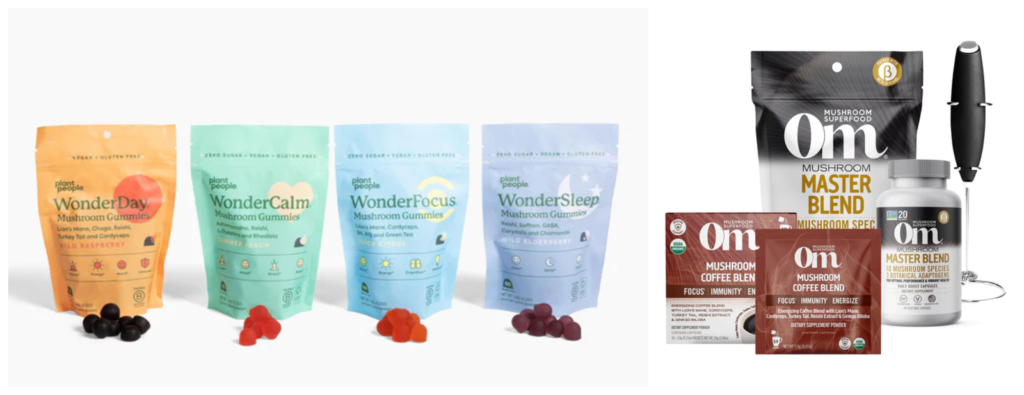Mushrooms are a type of fungi that have been consumed for centuries for their medicinal and culinary benefits. In recent years, the popularity of mushrooms has increased, and there are now various mushroom products available in the market. In this blog post, we will compare four popular mushroom products: mushroom gummies, mushroom powders, and mushroom drinks. We will explore the pros and cons of each product and examine their bioavailability and serving sizes.
- Mushroom Gummies
Mushroom gummies are a fun and easy way to consume mushrooms. They come in various flavors and are convenient to take on the go. They are also a great option for people who don’t like the taste of mushrooms or have difficulty swallowing pills. Most mushroom gummies are vegan and are infused with mushroom extract.
Pros:
- Fun and easy to consume
- Convenient for on-the-go use
- Good option for people who don’t like the taste of mushrooms
- Often come in various flavors
Cons:
- Limited variety of mushroom strains available in gummy form
- May contain added sugars or artificial colors and flavors
- Lower bioavailability compared to other forms
Bioavailability: The bioavailability of mushroom gummies is lower than other forms because they have to go through the digestive system to be absorbed into the bloodstream. The bioavailability also depends on the quality of the mushroom extract used.
Serving Size: The serving size of mushroom gummies varies depending on the brand and the type of mushroom extract used. Generally, the recommended serving size is 2-4 gummies per day.
As Seen on TikTok: Auri Super Mushroom Gummies
- Mushroom Powders
Mushroom powders are one of the most popular ways to consume mushrooms. They are versatile and can be added to food and drinks. Mushroom powders are made by drying and grinding the mushroom into a fine powder. They can be made from various mushroom strains, including shiitake, reishi, and lion’s mane.
Pros:
- Versatile and can be added to food and drinks
- Made from various mushroom strains
- Easy to store and transport
- Often contain high concentrations of beta-glucans
Cons:
- May have a strong taste or odor
- Some mushroom powders may be adulterated or low quality
- May not dissolve well in liquids
Bioavailability: The bioavailability of mushroom powders depends on the quality of the powder and how it is prepared. Mushroom powders can be mixed with water or other liquids to increase their bioavailability. Beta-glucans, the active compounds in mushrooms, are often concentrated in mushroom powders.
Serving Size: The recommended serving size of mushroom powders varies depending on the brand and the type of mushroom. Generally, the recommended serving size is 1-2 teaspoons per day.
Shop All Mushroom Powders
- Mushroom Drinks
Mushroom drinks are a convenient and tasty way to consume mushrooms. They are often made with mushroom extracts and come in various flavors. Mushroom drinks can be consumed hot or cold and are often mixed with other beneficial ingredients such as herbs and spices.
Pros:
- Convenient and tasty
- Often contain other beneficial ingredients
- Easy to consume
Cons:
- Limited variety of mushroom strains available in drink form
- May contain added sugars or artificial flavors
- Lower bioavailability compared to other forms
Bioavailability: The bioavailability of mushroom drinks depends on the quality of the mushroom extract used and how it is prepared. Mushroom drinks are often made with hot water, which can increase the bioavailability of the mushroom extract.
Serving Size: The recommended serving size of mushroom drinks varies depending on the brand and the type of mushroom. Generally, the recommended serving size is 1-2 cups per day.
Best Selling Mushroom Drink: Plant People NightLight Mushroom Cacao Mix




